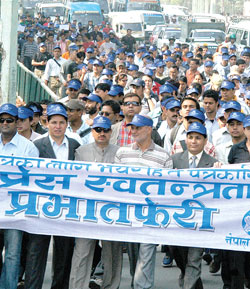|
|
"Be assured, there will be no anti-press activities on our behalf. We are committed to press freedom, freedom of expression, and loktantra." This statement by Pushpa Kamal Dahal to the Federation of Nepali Journalists last September brought hope of a new golden age for press freedom. Journalists had weathered a terrible storm the past ten years, with reporters intimidated, harassed, fired, kidnapped, and even murdered by both the state and the Maoists in one of the most dangerous journalistic environments in the world. Now more assassins lurk on the doorstep after a too-brief respite.
The elimination of independent media has long been a favoured tactic of regimes that wish to suppress free speech, and it is disheartening to see these dark forces return. A competitive and free press provides an essential function in a healthy democracy as a check on the power of the corrupt and incompetent. As the proverbial 'fourth estate', an independent press provides a voice for the voiceless. But now, Maoist-supported groups and others are attempting to stifle dissenting voices through intimidation. Samacharpatra and Mahanagar have returned to the newsstands, but independent newspapers within and outside the capital are increasingly being pressured to be political mouthpieces, with warnings of dire results if they do not comply.
This is added to a disturbing larger trend gaining ground throughout Nepal that journalists are fair game for assault, and not just by the state. Physical attacks upon individual reporters are increasing, from not only groups like the JTMM-Goit, the YCL, and the MJF, but even from individuals and relatives of those exposed for corruption. The pen may be mightier than the sword, but journalists cannot be treated as if they were armed fighters on the frontlines.
Reversing this trend will require Information and Communications Minister Krishna Bahadur Mahara to take three courageous steps. First, he should use his leadership position to work with Labour and Transport Minister Ramesh Lekhak to publicly and universally disown violence of any form against news organisations or those who work for them. This means serving as an honest broker for legitimate labour movements representing those mistreated by media outlets, but also condemning the strong arm tactics of the Maoist-influenced All-Nepal Communication, Press, and Publications Trade Union, and actively prosecuting those who use violence as a means of action. Members of any organisation have the right to assembly and fair employment; they do not have the right to threaten their superiors with violence if their political demands are not met.
Second, Mahara needs to take a leading and visible role in ensuring all media personnel can do their job in the run-up to the elections without fear of reprisal. There will be tremendous pressure to harass and threaten journalists from all sides of the political spectrum, and the time is now to set a strong public policy that explicitly ensures journalistic freedom. There is growing concern that government outlets will be used as propaganda tools, and appointing Maoists Om Sharma and Rishi Raj Baral as heads of the state newspaper and TV stations does not instil confidence in impartiality. Allowing the opposition to make its voice heard would prove to those both within and outside Nepal that the CPN-M is interested in democracy at least as much as its own power.
Third, Mahara should ensure that the Working Journalist Act of 2051 is effectively enforced and also updated to protect those in radio, TV, internet, and government-run media outlets as well as print. This simple step will serve to legally protect those who agree or dissent, from Royalist to Maoist. Publicly supporting even a single journalist who disagrees with the Mahara/Maoist party line would deliver a powerful message of legitimisation not only to voters and a still-sceptical assembly, but also to an international community that desperately wishes for a fully democratic Nepal. Upholding the rights of all journalists would teach that victimisation of those in the media is never acceptable.
Now is your chance to prove the detractors and diplomats wrong, Mr Mahara. Nepal, and the world, is watching and waiting for your leadership.
Jason Miklian is a South Asia researcher at the International Peace Research Institute of Oslo. He can be reached at [email protected]



